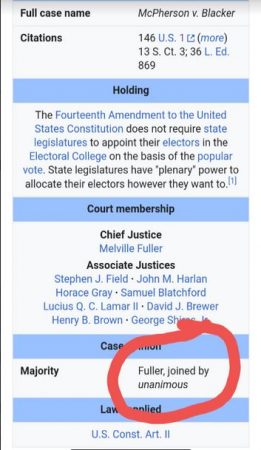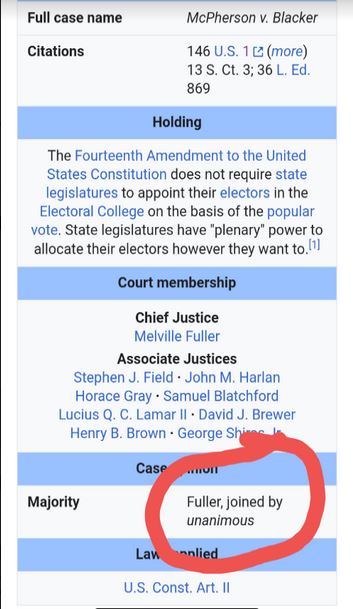by Ren Jander, ©2020

(Dec. 8, 2020) — I woke up this morning to a more awakened America. Thanks to The Gateway Pundit for featuring my research. And thanks to the Natural Born Citizen blog for handling the good questions generated in the 900 comments at TGP. They quoted a key passage from the unanimous opinion of the United States Supreme Court in Mcpherson v. Blacker, and this led me to take another look at this paramount precedent concerning plenary authority of the State Legislatures. And it’s having a revolutionary effect on strategy for members of the relevant State Legislatures to go forward and appoint electors.
I am now strongly encouraging that brave State Legislature members, like Mark Finchem in Arizona, and the four patriotic State Legislature members in Georgia, Senators Dolezal, Ligon, Beach and Jones, move forward appointing electors in those districts where they have a majority, not waiting for the whole chamber to agree. Why do I think they can do that? Because the Supreme Court has recognized this manner of appointing electors in McPherson v. Blacker:
“The final result seems to have reconciled contrariety of views by leaving it to the state legislatures to appoint directly by joint ballot or concurrent separate action, or through popular election by districts or by general ticket, or as otherwise might be directed.
“Therefore, on reference to contemporaneous and subsequent action under the clause, we should expect to find, as we do, that various modes of choosing the electors were pursued, as, by the legislature itself on joint ballot; by the legislature through a concurrent vote of the two houses; by vote of the people for a general ticket; by vote of the people in districts; by choice partly by the people voting in districts and partly by the legislature; by choice by the legislature from candidates voted for by the people in districts; and in other ways, as, notably, by North Carolina in 1792, and Tennessee in 1796 and 1800. No question was raised as to the power of the State to appoint, in any mode its legislature saw fit to adopt, and none that a single method, applicable without exception, must be pursued in the absence of an amendment to the Constitution.”
If you can’t get a majority in one chamber or the other, it can be done by “Joint Ballot”, which is a parliamentary procedure of both houses voting as one chamber, and all you need is a quorum.
Alternatively, if you can get neither a joint ballot or concurring House and Senate, then if you have a majority joint ballot of Reps and Senators in separate districts, McPherson v. Blacker mentions splitting the electors, part by general election and part by the Legislature appointing directly. If your constituents are behind you, then join together in your separate districts; have your chosen electors meet anywhere in your States on December 14th; take their votes; send your district slates to Congress; and let Congress figure out what to do. Sue any Executive Branch obstacle for Writ of Prohibition that gets in your way, but they won’t sue you, because they will lose. You have plenary authority. Until SCOTUS stops you, nobody else can.
Send your district slates, cause havoc at the Electoral College, but at least this havoc is legal, sanctioned by SCOTUS, and it will be done to combat rampant unchecked fraud. Havoc at the Electoral College is nothing new. It’s downright American. Better that than getting clubbed to death in the middle of the night.
Ren Jander, J.D
Looking for all of your news in one place? Try Whatfinger, your one-stop aggregator of news, opinion and everything else.


This sounds very good. However, the Dems may likely try to invoke the Electoral Count Act of 1887, according to this academic paper: https://www.luc.edu/media/lucedu/law/students/publications/llj/pdfs/vol-51/issue-2/7_Foley%20(309-362).pdf
This Act looks to be unconstitutional however, not for the reasons given in the law paper, but because it clearly privileges the governor over the state legislature. I hope the justices are prepared to strike it down as part of their ruling in accordance with McPherson and Bush v. Gore.
I’d like to see the same writer comment on this.
Do you have open communication?
1992 un agenda21 depopulation
1992 nafta de industrialization of the USA by Democrats in theWhitehouse . Never let a Democrat into power save the country!
Arrest every person who had a hand in this in the Governments, Voting Machine Businesses and all the foreign & domestic persons and companies.
Hold them in Jail, without bail, while the DOJ/FIB come fully under Trump’s direct control of investigations. Take 6 months to investigate, indict and begin trials. If DOJ/FIB kick back, bring in Marshal Law and set up Military tribunals and firing squads.
This is exactly my thoughts on the way the state legislatures should always select the electoral college. I had no idea that it should have been this way already. Why should one large city over rule 90% of the state when it come to a state wide vote? That is a pure democracy and mob rules. If that big city wants to send an elector for a Communist, fine. But they should not be able to speak for the rest of the state. Electors by district on a joint slate is the way it should always be. Why did this change?
That seems to be the same reason as the electoral colleges principles just at the state level. Are you saying that electoral votes be split up for the state when the electoral college meets? I mean if a state has 26 votes and those votes are split democrat/republican 11/12. Twelve votes would go republican and 11 democrat. I’m trying to understand it… Everything has me mixed up..
“send your district slates to Congress; and let Congress figure out what to do.”
Be sure to follow 3 U.S. Code § 9 and include the list of electors furnished to them by the governor of the state.
“The electors shall make and sign six certificates of all the votes given by them, each of which certificates shall contain two distinct lists, one of the votes for President and the other of the votes for Vice President, and shall annex to each of the certificates one of the lists of the electors which shall have been furnished to them by direction of the executive of the State.”
Also make sure the governor has sent the credentials of the electors to the National Archives per 3 U.S. Code § 6.
“It shall be the duty of the executive of each State, as soon as practicable after the conclusion of the appointment of the electors in such State by the final ascertainment, under and in pursuance of the laws of such State providing for such ascertainment, to communicate by registered mail under the seal of the State to the Archivist of the United States a certificate of such ascertainment of the electors appointed”
At this point this is getting silly.
3 U.S.C. § 9 is unconstitutional in that it invades plenary authority of Legislature. This is a known flaw in it, as well as “safe harbor”. Congress has plenary authority over time, and Legislatures over everything else.
A nautical birdie sent them a tip via their tip contact link in their ABOUT page regarding your excellent article(s) on ThePost&Email and suggested they read them, especially the one about the SCOTUS 9-0 decision you wrote about several weeks ago and if they thought it deserved coverage in their news site to do a blurb on it. And they did. The same birdie sent it to Justice Alito. Bravo Zulu for your excellent legal scholarship and research. CDR Charles Kerchner (Ret) — ProtectOurLiberty.org